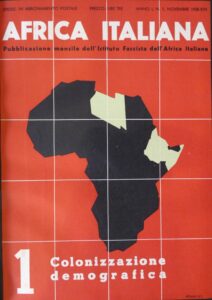This KNIR Research Dialogue offers an interpretation of fascist colonial rhetoric and practices in North and East Africa
between 1922 and 1943 from the perspective of the environmental history.
On the one hand, it highlights the historic paramount role played by the environment in shaping fascist policies and propaganda; on the other hand, it deploys the potential of the environment as an analytical tool to show the shortcomings of fascist enterprises.
Drawing on gaps between propagandistic and administrative primary sources, the talk explores three stories of ecological failures and weaves such stories’ strands together into the surprisingly non-cohesive whole of the fascist political agenda. Two stories from Italo-Libyan farms and villages challenge the allegedly miraculous transformation of the desert into verdant fields; one story from the mining landscape of East Africa questions the autarchic scheme of the regime and the role the colonies were supposed to play out in it.
About the speaker
Roberta Biasillo is assistant professor in contemporary political history at Utrecht University. She earned a PhD in Modern European History at the University of Bari. She has been a postdoctoral researcher at the KTH Royal Institute of Technology in Stockholm, the Rachel Carson Center for Environment and Society in Munich, and the European University Institute in Florence.
Her research interests lie at the confluence of environmental history and political history. She has focused on how marginal environments embedded in Italian nineteenth century liberalism and on the role of African colonial environments in shaping Italian fascism. She has finalised a forthcoming monograph in Italian reconstructing the history of the Pontine Marshes from the 1870s to the 1920s from an environmental microhistory perspective. Her co-authored volume Mussolini’s Nature. An Environmental History of Fascism has been recently published by the MIT press. Her research project on the global environmental history of Modern Libya has been granted by the NWO Dutch Research Council.
© image on top of the page (banner): Bianchi, Risorse minerarie dell’A.O.I., Africa Italiana, Maggio 1939, p. 2. Source: Biblioteca Nazionale Centrale di Roma.



